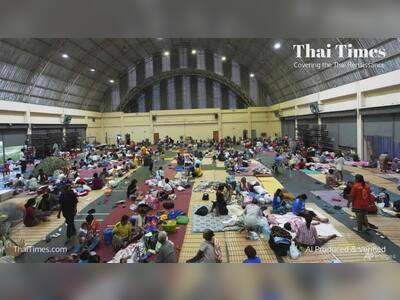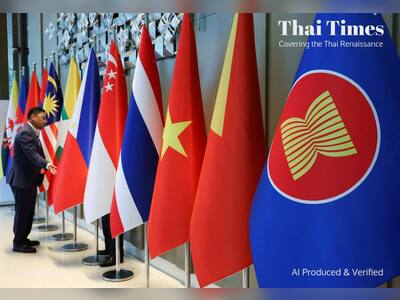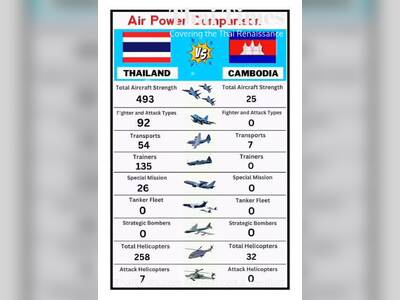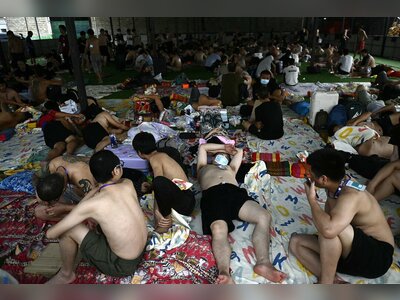Israel Prioritizes Safety of Thai Workers Amid Ongoing Military Operations
Israeli Ambassador to Thailand, Orna Sagiv, has affirmed the Israeli government's commitment to ensuring the safety of approximately 40,000 Thai workers currently residing in Israel, amid ongoing military operations against Iran.
This announcement follows heightened regional tensions and hostilities that have persisted for five consecutive days.
In an interview, Ambassador Sagiv described a comprehensive protection framework aimed at safeguarding Thai laborers during this turbulent period.
"Thai people have shelters.
They have instructions in Thai.
Their employers are looking after them.
They are running to shelters like their employers," she stated, highlighting measures such as translated safety instructions, employer-supervised shelter protocols, and established communication channels.
The Israeli government is coordinating closely with Thailand's Ministry of Labor.
Representatives from Thailand have been stationed in Tel Aviv to maintain direct contact with Israeli authorities regarding the safety of Thai nationals.
Sagiv emphasized the importance of acclimating newly arrived workers to security protocols unfamiliar to them.
"We are doing everything in our power to give them the explanation and to explain that it can be dangerous if you hear maybe siren.
This is what you need to do," she said.
Despite the ongoing conflict, the number of Thai workers in Israel has risen from an estimated 25,000-30,000 before October 7, 2023, to nearly 40,000.
Although Thailand's Prime Minister initially called for the return of nationals after the outbreak of hostilities, many workers requested to return to Israel soon after.
Ambassador Sagiv remarked, "The moment they came back here, they started asking us how do we go back to Israel," interpreting this as a sign of trust in Israel's commitment to worker safety.
Plans are also underway for a new Memorandum of Understanding to expand the roles of Thai workers beyond agriculture into industrial and construction sectors.
The Thai government, however, has announced a temporary pause on sending new workers to Israel due to escalating security concerns.
Ambassador Sagiv expressed hope that this decision could be revisited once conditions improve, while currently, flight restrictions hinder any movement.
Amid the intensified military actions, Israel has reported facing approximately 400 long-range ballistic missiles and over 850 drone attacks attributed to Iranian forces within five days.
Casualties reported include 24 fatalities and over 600 injuries, predominantly affecting civilian areas, such as bus stops and residential neighborhoods.
Ambassador Sagiv addressed concerns from the Thai public regarding Israel's military operations, posing critical questions about national security responses.
"What would you have done?" she queried, referencing the presence of a neighboring country engaging in nuclear activities that could pose threats to Thailand.
The ambassador noted that Iran's nuclear aspirations are perceived as a concern not only for Israel but also for broader international security, potentially affecting Asian countries, including Thailand.
Regarding current diplomatic efforts, Sagiv expressed skepticism about Iran's reliability in negotiations, citing a history of deceit regarding its nuclear program.
"For years, Iran proved its capabilities to lie and deceive the world.
We don't believe them," she asserted, highlighting the ongoing military objectives Israel aims to achieve.
Sagiv acknowledged that while there might be future opportunities for diplomatic engagement, Israel remains focused on its military strategy.
The ambassador indicated that even critics of Israel recognize the potential global threats posed by Iran's nuclear ambitions, suggesting a level of support for Israel's actions in the international community.
As the situation develops, Israel continues to prioritize the safety of foreign workers while navigating complex regional security dynamics and calling for increased awareness of the existential threats it perceives from Iran.
In an interview, Ambassador Sagiv described a comprehensive protection framework aimed at safeguarding Thai laborers during this turbulent period.
"Thai people have shelters.
They have instructions in Thai.
Their employers are looking after them.
They are running to shelters like their employers," she stated, highlighting measures such as translated safety instructions, employer-supervised shelter protocols, and established communication channels.
The Israeli government is coordinating closely with Thailand's Ministry of Labor.
Representatives from Thailand have been stationed in Tel Aviv to maintain direct contact with Israeli authorities regarding the safety of Thai nationals.
Sagiv emphasized the importance of acclimating newly arrived workers to security protocols unfamiliar to them.
"We are doing everything in our power to give them the explanation and to explain that it can be dangerous if you hear maybe siren.
This is what you need to do," she said.
Despite the ongoing conflict, the number of Thai workers in Israel has risen from an estimated 25,000-30,000 before October 7, 2023, to nearly 40,000.
Although Thailand's Prime Minister initially called for the return of nationals after the outbreak of hostilities, many workers requested to return to Israel soon after.
Ambassador Sagiv remarked, "The moment they came back here, they started asking us how do we go back to Israel," interpreting this as a sign of trust in Israel's commitment to worker safety.
Plans are also underway for a new Memorandum of Understanding to expand the roles of Thai workers beyond agriculture into industrial and construction sectors.
The Thai government, however, has announced a temporary pause on sending new workers to Israel due to escalating security concerns.
Ambassador Sagiv expressed hope that this decision could be revisited once conditions improve, while currently, flight restrictions hinder any movement.
Amid the intensified military actions, Israel has reported facing approximately 400 long-range ballistic missiles and over 850 drone attacks attributed to Iranian forces within five days.
Casualties reported include 24 fatalities and over 600 injuries, predominantly affecting civilian areas, such as bus stops and residential neighborhoods.
Ambassador Sagiv addressed concerns from the Thai public regarding Israel's military operations, posing critical questions about national security responses.
"What would you have done?" she queried, referencing the presence of a neighboring country engaging in nuclear activities that could pose threats to Thailand.
The ambassador noted that Iran's nuclear aspirations are perceived as a concern not only for Israel but also for broader international security, potentially affecting Asian countries, including Thailand.
Regarding current diplomatic efforts, Sagiv expressed skepticism about Iran's reliability in negotiations, citing a history of deceit regarding its nuclear program.
"For years, Iran proved its capabilities to lie and deceive the world.
We don't believe them," she asserted, highlighting the ongoing military objectives Israel aims to achieve.
Sagiv acknowledged that while there might be future opportunities for diplomatic engagement, Israel remains focused on its military strategy.
The ambassador indicated that even critics of Israel recognize the potential global threats posed by Iran's nuclear ambitions, suggesting a level of support for Israel's actions in the international community.
As the situation develops, Israel continues to prioritize the safety of foreign workers while navigating complex regional security dynamics and calling for increased awareness of the existential threats it perceives from Iran.











